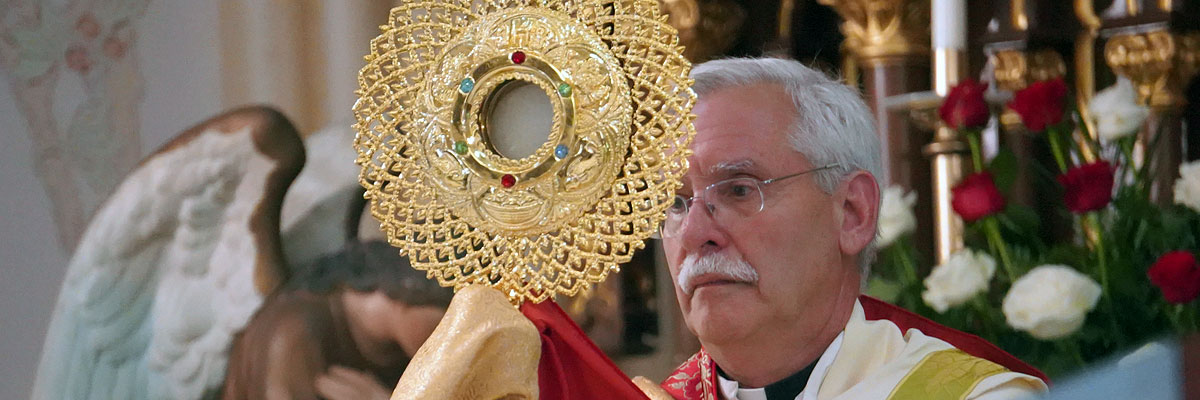Official Website of the
Catholic Diocese of Little Rock
Moses, Miriam and Aaron challenge God
Published: September 10, 2011
This is the fourth column in a 13-part series
By Clifford M. Yeary
Associate Director, Little Rock Scripture Study
Leo Tolstoy begins "Anna Karenina" with the assertion that unhappy families make for more interesting stories. Moses is so central to Exodus and Numbers that we might forget they also tell a very interesting story of a family of unhappy siblings.
 Moses definitely overshadows his older brother Aaron, but we have to deliberately search for their oft hidden sister Miriam. Her first appearance is anonymous but extremely important. Moses' story begins with his birth in Egypt during the reign of a cruel Pharaoh "who knew nothing of Joseph" (Exodus 1:8). Under Pharaoh's orders, the midwives of Egypt were to drown all Hebrew males in Nile at birth (Exodus 1:17-22).
Moses definitely overshadows his older brother Aaron, but we have to deliberately search for their oft hidden sister Miriam. Her first appearance is anonymous but extremely important. Moses' story begins with his birth in Egypt during the reign of a cruel Pharaoh "who knew nothing of Joseph" (Exodus 1:8). Under Pharaoh's orders, the midwives of Egypt were to drown all Hebrew males in Nile at birth (Exodus 1:17-22).
The midwives feared God more than Pharaoh, telling him the Hebrew women are too strong and give birth before they can arrive. Three months after Moses' birth, however, it is still necessary to hide him from harm and so he is placed in a basket prepared as carefully as Noah's Ark and launched into the Nile. This is where we first meet Miriam. She is named only as Moses' sister, but her role is crucial. As the infant Moses is set adrift, she keeps watch over him until he is safely disembarked into the arms of Pharaoh's daughter (Exodus 2:1-7).
Aaron enters the story much later. Outside the notice of his birth in Exodus 6:20, we do not hear of him until after the adult Moses has slain an Egyptian and fled to Midian. There, God speaks to Moses through the flames of a bush that remains unburned, telling him to return to Egypt and to deliver the children of Israel from Pharaoh's power (Exodus 3:1-10). Moses asks God to reconsider, telling God he is too poor a speaker to meet such a great challenge (Exodus 4:10-17).
God, apparently acknowledging Moses' weakness, says the eloquent Aaron can serve as Moses' prophet (Exodus 7:1). Aaron then becomes responsible for proclaiming the words to Pharaoh that God has actually sent Moses to deliver. Moses will tell Aaron what to say and Aaron will then proclaim it (Exodus 4:16). Today, we might call Aaron Moses' press secretary, except that he and Moses share a rod (or staff) through which signs of God's authority will be revealed to Pharaoh.
Aaron will be at Moses' side, speaking for him and even launching the plagues with the divinely empowered staff (Exodus 7–14). Miriam is unheard from until Exodus 15:20-21, but her appearance there is of great significance. God has opened the way through the sea to Moses and the Israelites, but Pharaoh and his pursuing army of chariots have all been washed away as the crushing waters flowed back together.
Miriam's reappearance comes with the claim that she was a prophet in her own right. In what many scholars consider one of the oldest passages of Scripture of all time, Miriam led a liturgical response to God's saving deed with her tambourine: "Sing to the Lord, for he is gloriously triumphant;/ horse and chariot he has cast into the sea" (Exodus 15:21).
Moses, Aaron and Miriam, in one way or another have now each been identified in Exodus as a prophet. Aaron is also named as the first high priest of the whole nation of Israel, the one who will offer the most significant sacrifices in the proper order of worship that God will reveal to Moses on Mt. Sinai (Exodus 28:1-3).
But Miriam's status as a prophet and Aaron's priesthood lead to a struggle of power between them and their brother Moses. Miriam and Aaron have fallen out with Moses, apparently over his marriage to the non-Israelite Zipporah (Numbers 12:1). "They complained, 'Is it through Moses alone that the Lord has spoken? Has he not spoken through us also?'" (Numbers 12:2).
Moses is too humble to assert his authority, but God calls his siblings to task. They may be prophets, but God has no prophet on earth the like of Moses. Miriam bears the brunt of the punishment. She is sent out of the camp with a leprous condition for a week (Numbers 12:3-15). Miriam is not heard from again until her death (Numbers 20:1). Aaron goes on to graver faults. While Moses is on the mountain receiving the Ten Commandments, he smelts a golden calf for the people to worship (Exodus 32:1-6).
Aaron (Numbers 20:28) and Moses will both die before entering the Promised Land, but Moses will at least be allowed to see it (Deuteronomy 34:1-6).
Study Questions
- When have sibling rivalries affected your own relationships or those to whom you are close?
- How did Miriam and Aaron both help and hinder Moses?
- What more about Miriam would you like the biblical record to have told?
- What models of leadership do you think make for the smoothest of relations between people who share various duties and responsibilities?
This article was originally published in Arkansas Catholic Sept. 10, 2011. Copyright Diocese of Little Rock. All rights reserved. This article may be copied or redistributed with acknowledgement and permission of the publisher.









